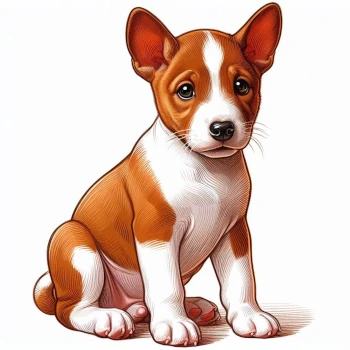
The Basenji, also known as the "barkless dog," is a breed of dog originating from Central Africa, specifically the Congo. Known for its elegant appearance, independent behavior, and unique ability to produce sounds similar to yodels rather than barks, the Basenji is a unique and fascinating companion dog.
Physically, the Basenji is a small to medium-sized dog, with males typically measuring between 41 and 43 cm at the withers, while females measure between 38 and 41 cm. Their weight ranges from 9 to 11 kg. The Basenji's body is athletic and well-proportioned, with a deep chest and a straight back. The head is finely chiseled, with a flat skull and a tapered muzzle. The eyes are almond-shaped, dark in color, and express a distinctive alertness and intelligence. The ears are small, pointed, and erect, adding to the breed's alert and curious appearance.
The Basenji's coat is short, fine, and smooth, requiring minimal grooming. The coat can come in several colors, including red, black, brindle, or a combination of these colors with white. White markings are typically present on the feet, chest, and tip of the tail. Due to its short coat, the Basenji is a relatively low-maintenance breed and only requires regular brushing to maintain cleanliness and shine.
In terms of personality, the Basenji is known for its independent, curious, and sometimes stubborn nature. It is very attached to its family and can be very affectionate, but it maintains a certain reserve and independence. Its alert and lively nature makes it an excellent hunter and a vigilant watchdog. However, its independence and intelligence require patient and consistent training, as well as early socialization to ensure balanced behavior. The Basenji is also known for its almost feline-like cleanliness, spending a lot of time grooming itself.
The Basenji is an active breed that needs plenty of exercise to stay physically and mentally healthy. It enjoys long walks, games, and activities that stimulate its mind and body. In terms of health, the Basenji is generally robust, but like all breeds, it can be prone to certain health issues such as hip dysplasia, eye disorders, and kidney diseases. A balanced diet, regular veterinary care, and appropriate exercise are essential to maintaining its overall health.

The Basenji Puppy is intelligent and curious, but can be stubborn, requiring an experienced owner for its training. This dog does not bark but makes a unique sound called a "barroo." With its short and silky coat, the Basenji requires little maintenance and thrives in an environment where it can explore and expend its energy.
The price of a Basenji Puppy typically ranges from 1,000 to 2,500 euros. Puppies from champion lines or reputable breeders can command higher prices, depending on the quality of the pedigree and health tests. Costs can also fluctuate based on region and demand.
Training a Basenji puppy requires patience and understanding, as this breed is independent and sometimes stubborn. Socialization is essential to help your puppy adapt to various environments and interactions. Gradually expose it to noises, people, and other animals so that it becomes a balanced and sociable dog.
House training is a crucial step in your Basenji's education. Use a positive and consistent method to teach it to do its business outside. Reward it every time it goes to the right place and avoid punishing it for accidents. Consistency and patience are key in this process.
Teach basic commands like "sit", "lie down", and "come" in a fun and positive way. Use treats and praise to encourage your puppy to obey. Short, regular training sessions are more effective than a long one.
The Basenji is an active breed that needs regular exercise to stay healthy and happy. Provide it with daily walks and play sessions to channel its energy. Activities like running or ball games will help it stay fit and develop its natural skills.
Finally, remember that each puppy is unique. Adapt your training approach according to the personality and specific needs of your Basenji. With patience, love, and consistency, you will see your puppy grow into a well-trained and fulfilled companion.